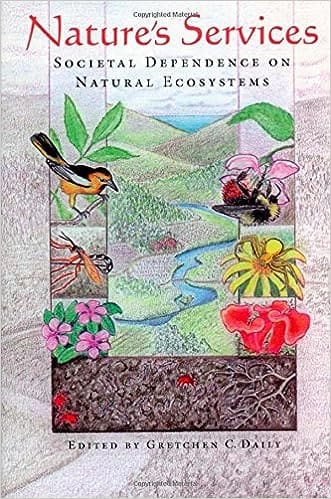Nature’s Services: Societal Dependence On Natural Ecosystems
To truly understand why we need to protect our ecosystem services now more than ever, it’s essential to educate ourselves about their immense value and the threats they face. A great way to start is by reading Gretchen Daily’s book, “Nature’s Services: Societal Dependence On Natural Ecosystems” ↗.
This insightful read provides a comprehensive look into the societal dependence on natural ecosystems and how our actions impact these vital services. It’s a must-read for anyone who cares about the environment and wants to make a difference.
Don’t wait until it’s too late. Learn about the vital role of nature in our lives and how we can all contribute to its protection. Get your copy today and join the movement to protect our ecosystem services for future generations.
Introduction
Ecosystem services are the multitude of benefits that nature provides to human life. These natural processes, from the air we breathe to the water we drink, are so integral that without them, life as we know it simply wouldn’t exist. Yet, these services are under threat from various human activities. This blog post aims to shed light on why we need to protect ecosystem services now more than ever.
Understanding Ecosystem Services
Ecosystem services are the benefits we gain from the environment and its ecosystems. They’re typically categorized into four types: provisioning, regulating, supporting, and cultural services.
Provisioning services are the products obtained from ecosystems, such as food, fresh water, wood, and medicinal resources. A great example is the Amazon rainforest, often referred to as the planet’s ‘green lung,’ which provides us with around 20% of our oxygen supply.
Regulating services are the benefits obtained from the regulation of ecosystem processes. This includes climate regulation, natural hazard regulation, water purification, and disease control. For instance, wetlands act as natural water filters, significantly improving water quality.
Supporting services are those necessary for the production of all other ecosystem services. They include nutrient cycling, soil formation, and primary production.
Lastly, cultural services are the non-material benefits people obtain from ecosystems. These include spiritual enrichment, cognitive development, reflection, recreation, and aesthetic experiences. National parks, like Yellowstone or Banff, provide these cultural benefits, allowingus to connect with nature and find peace away from bustling city life.
The Importance of Ecosystem Services
Ecosystem services are the backbone of our existence and economic well-being. For instance, it’s estimated that insect pollinators, like bees, contribute approximately $235 to $577 billion to global food market values annually. On a smaller scale, we all benefit from ecosystem services when we drink clean water from our taps, made possible by natural filtration processes.
Threats to Ecosystem Services
Unfortunately, ecosystem services face significant threats from human activities. Climate change, deforestation, overpopulation, pollution, and biodiversity loss are all damaging our precious ecosystems. For instance, the Amazon rainforest has lost approximately 17% of its forest cover in the last 50 years due to deforestation, primarily for cattle ranching.
Why We Need to Protect Ecosystem Services Now More Than Ever
Given the increasing intensity of these threats, protecting ecosystem services has never been more critical. If current trends continue, we risk losing essential services. For instance, due to climate change and habitat loss, many pollinators are at risk of extinction, which could compromise our food security.
Strategies for Protecting Ecosystem Services
But there is hope. At every level, from individuals to global organizations, we can take action. Here are some strategies:
- Individual Level: Make sustainable choices. For example, by choosing products certified by the Rainforest Alliance, we can help protect ecosystems. One recommended product is Brita’s Water Filter Pitcher ↗ that reduces the need for plastic water bottles, decreasing pollution and energy consumption.
- Community Level: Participate in local conservation efforts, such as tree planting, community cleanups, and education campaigns.
- National Level: Support policies and legislation that protect ecosystems and biodiversity. This can include voting for leaders who prioritize these issues.
- Global Level: Support international initiatives focused on ecosystem protection, such as the United Nations’ Sustainable Development Goals.
Conclusion
The protection of ecosystem services is not just about preserving the beauty of nature. It’s about safeguarding our own future. It’s about ensuring that our children and grandchildren can still enjoy clean air, drink fresh water, and marvel at the diversity of life on Earth. The time to act is now.
References
- Millennium Ecosystem Assessment. (2005). Ecosystems and Human Well-being: Biodiversity Synthesis. World Resources Institute, Washington, DC. Link ↗
- Potts, S.G., et al. (2016). Safeguarding pollinators and their values to human well-being. Nature, 540, 220–229. DOI: 10.1038/nature20588 ↗
- Butler, R. A. (2019, July 31). Amazon Destruction. Mongabay. Link ↗
- Rainforest Alliance. (n.d.). What Does the Rainforest Alliance Certified™ Seal Mean? Link ↗
- United Nations. (n.d.). Sustainable Development Goals. Link ↗
Related Articles
Thanks for exploring our article on the urgent need for protecting ecosystem services. We hope you’ve found it insightful and informative. If you’re interested in related topics, we encourage you to check out these other articles on sunnydaysgo.com:
- The Importance of Biodiversity Conservation You Need to Know ↗
- Chapter 4: Uncovering the Truth ↗
- Conservation Initiatives in Alberta’s Public Land Use Zones (PLUZs) ↗
- Striking a Balance in Public Land Use Zones in Alberta ↗
- Your 5 Best Sunscreens for Dry Skin Protection ↗
This script creates a share button. When clicked, it will open the native sharing options on the user’s device, allowing them to share the list of articles using their preferred method (e.g., email, social media, messaging apps, etc.). Please note that this script uses the Web Share API, which at the time of my training (September 2021), is supported in most modern browsers but not in all (e.g., not supported in Firefox and Internet Explorer). Please check the current compatibility if you choose to use this script.

